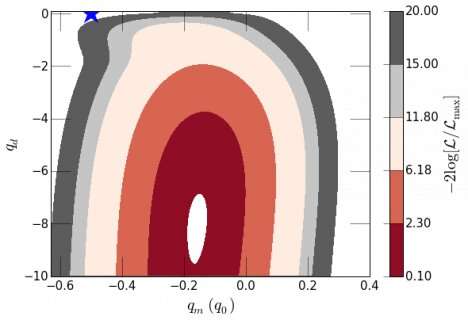
At first sight, this media release re a new paper sounds like the usual plaint along the lines that dark energy must exist but we haven’t found any. Curiously though, we learn,
Professor Sarkar explains: “The cosmological standard model rests on the assumption that the Universe is isotropic around all observers. This cosmological principle is an extension of the Copernican principle—namely that we are not privileged observers. It affords a vast simplification in the mathematical construction of the cosmological model using Einstein’s theory of general relativity. However when observational data are interpreted within this framework we are led to the astonishing conclusion that about 70% of the universe is constituted of Einstein’s Cosmological Constant or more generally “dark energy.” This has been interpreted as due to quantum zero-point fluctuations of the vacuum but the associated energy scale is set by H0, the present rate of expansion of the universe. This is however a factor of 1044 below the energy scale of the standard model of particle physics—the well-established quantum field theory that precisely describes all subatomic phenomena. Its zero-point fluctuations have therefore a huge energy density which would have prevented the universe from reaching its present age and size if they indeed influence the expansion rate via gravity. To this cosmological constant problem must be added the “why now?” problem, namely why has dark energy come to dominate the universe only recently? It was negligible at earlier times, in particular at an age of ~400,000 years when the primordial plasma cooled sufficiently to form atoms and the cosmic microwave background (CMB) radiation was released (hence the CMB is not directly sensitive to dark energy).”
“Our analysis is data-driven but supports the theoretical proposal due to Christos Tsagas (University of Thessaloniki) that acceleration may be inferred when we are not Copernican observers, as is usually assumed, but are embedded in a local bulk flow shared by nearby galaxies, as is, indeed, observed. This is unexpected in the standard cosmological model, and the reason for such a flow remains unexplained. But independently of that, it appears that the acceleration is an artifact of our local flow, so dark energy cannot be invoked as its cause.
University of Oxford, “Evidence for anisotropy of cosmic acceleration” at Phys.org
If we are not privileged observers, maybe the universe is playing a trick on us. Put it down to the high costs of Copernicanism (= we are not special)
See also: Rob Sheldon: Are “multiple measurements ”closing in on dark energy? Nope.
Researchers: Either dark energy or string theory is wrong. Or both are. But dark energy is so glitzy! Isn’t it a line of cosmetics already?
Researchers: The symmetrons needed to explain dark energy were not found
Rob Sheldon: Has dark energy finally been found? In pop science mags?
Are recent dark energy findings a blow for multiverse theory?
and
Science at sunset: Dark energy might make a multiverse hospitable to life… if it exists